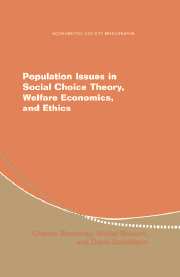Book contents
- Frontmatter
- 1 Introduction
- 2 Measurement of Individual Well-Being
- 3 Welfarist Social Evaluation
- 4 Fixed-Population Principles
- 5 Population Principles
- 6 Characterizations and Possibilities
- 7 Uncertainty and Incommensurabilities
- 8 Independence of the Existence of the Dead
- 9 Temporal Consistency
- 10 Choice Problems and Rationalizability
- 11 Applications
- References
- Author Index
- Subject Index
9 - Temporal Consistency
Published online by Cambridge University Press: 05 January 2013
- Frontmatter
- 1 Introduction
- 2 Measurement of Individual Well-Being
- 3 Welfarist Social Evaluation
- 4 Fixed-Population Principles
- 5 Population Principles
- 6 Characterizations and Possibilities
- 7 Uncertainty and Incommensurabilities
- 8 Independence of the Existence of the Dead
- 9 Temporal Consistency
- 10 Choice Problems and Rationalizability
- 11 Applications
- References
- Author Index
- Subject Index
Summary
Part A
In this chapter, we consider an intertemporal model in which individual wellbeing in each period when a person is alive is measured by a utility function. This allows us to formulate consistency conditions across periods. The first of these requires the ranking of any two alternatives whose per-period utilities differ in a single period only to be independent of utilities in other periods. Thus, social evaluations can be made on a per-period basis. The second, which is weaker, requires the ranking of two alternatives with a common past to be independent of past utilities but permits utilities in the present and future to influence it. When combined with some standard axioms, both consistency properties have undesirable consequences, the most important of which is that the repugnant conclusion is implied. Counterintuitive recommendations about killing are avoided, but at a significant cost. We conclude that both temporal-consistency axioms should be abandoned in favor of axioms such as independence of the existence of the dead, which allows history to matter by taking account of the possibility that individual lives may be over in some alternatives but continue into the present in others.
WELL-BEING IN EACH PERIOD
As in Chapter 8, we employ a multiperiod model with arbitrary period length. If a person ever lives, he or she is alive in a collection of contiguous periods and the maximum lifetime (in periods) is fixed at a finite number greater than one. An information profile provides, for each alternative and each potential person, a utility level for each period in which the person is alive (see Chapter 2 for a discussion) together with periods before birth, lengths of life, and other fixed nonwelfare information. Information for a possible alternative is provided in Table 9.1. In it, individuals 2, 21, 1,024, and 1,729 are alive in periods 4 to 9, 1 to 6, 7 only, and 3 to 5 with per-period utilities given by the entries in the table. Neutrality in a period is represented by a per-period utility of zero.
- Type
- Chapter
- Information
- Publisher: Cambridge University PressPrint publication year: 2005
- 4
- Cited by



